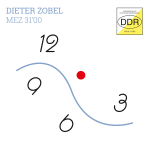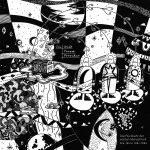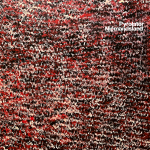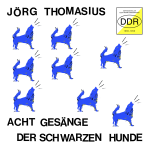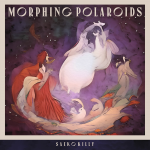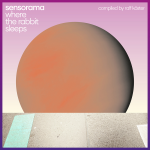DIETER ZOBEL
MEZ 31,00 (Experimenteller Elektronik-Underground DDR 1989)
[engl] Tension. Performance. Resistance - our Zonic Spezial documenting underground cassette culture in the latter years of the GDR caused quite a stir when it first appeared in 2006. A collaborative effort with the legendary ZickZack label and Verbrecher publishing house, “Spannung. Leistung. Widerstand. Magnetbanduntergrund DDR 1979-1990” (to give the work its full title) caused many lis- teners, especially those in the West, to prick up their ears in astonishment when they played the book’s accompanying CDs. This odd potpourri of swirling post-punk manifestations was compiled with solid interpretive authority by Bert Papenfuß, Bo Kondren, Bernd Jestram, and Ronald Lippok. They did, however, erroneously attribute one piece to Jörg Thomasius and Dieter Zobel’s Os- tkraut band Das Freie Orchester instead of the “Musik aus dem Regen” tape on their own Kröten Kassetten imprint.
Whilst the Zonic Spezial itself has become an eminently collectible rarity, Bureau B succeeded in making at least parts of the musi- cal spectrum available to a wider international audience with their 2014 release “Magnetband”. Serendipitously coinciding with the publication of a second book, “Magnetizdat DDR” (no listening material this time around), Bureau B now revisit the experimental electronic underground of the German Democratic Republic with two releases: “Acht Gesänge der schwarzen Hunde”, a collection of Jörg Thomasius productions spanning the years 1980 to 1990, and “MEZ 31,00” by Dieter Zobel aka Didier Leboz, recorded in 1988 and released as a solo Kröten cassette in the watershed year of 1989.
Das Freie Orchester emerged from the off-centre environs of Prenzlauer Berg in 1985 as a wild and outstanding descendent of the so-called Komplexbrigade. Ever open to progressive tendencies, with a strong predilection for all things Kraut (including Can, of course) and emboldened by the GDR free jazz which was sweeping the international scene as well as the Treptow Cultural Centre, upstairs and downstairs, the orchestra wholly identified with the concept of free expression: everything was improvised. As seriously as they took their sonic explorations, their love of unserious paronomasia was just as pronounced. Dieter Zobel, first and foremost DFO guitarist, dreamed up the Leboz brand name for the instruments he had built himself, then took DFO-speak a step further by christening his devices sadophone and masophone or Metallic Noise Masturbator, names which only served as rough approxima- tions of the bizarre sounds they generated.
“MEZ 31,00” was actually a rather more conventional production, based on a Yamaha CX5M purchased with Western currency left to him by his grandmother. The Yamaha would also spawn a further and possibly superior Zobel Kröten tape by the name of “Moschus”. Zobel, it should be said, was not so thrilled with the instrument, bemoaning the fact that “it was pretty hopeless, you couldn’t use it with a mouse and the MS DOS operating system was a nightmare. Today it would just get laughed at.” The only plus point he could find was its sound: “actually quite decent, eight voices with eight different sounds and multi timbral at that. An abso - lute first back then!”
The sequencer in particular was “hellish, you could only enter musical notation, there was no undo function and you couldn’t even record keyboards manually! There was no way you could listen to individual parts, you had to play back the whole thing to listen out for wrong notes and then write everything down on paper.. ouch! When you played faster sequences with lots of notes, it starting stuttering. But what the heck ...” Clearly not everything was perfect in the (Far-Eastern) electric West!
Zobel, fascinated then and now by minimal music in the style of Steve Reich and Terry Riley, nevertheless got to grips with the “in- fernal machine” and emulated the compositional techniques of the aforementioned masters he so revered. He layered numerous loops of the same sequence but of different length to create concentrated polyrhythmic forms. Those in the know were reminded of contemporary Japanese ambient works, including Hiroshi Yoshimura’s early albums or Yasuaki Shimizu’s "Music For Commercials". In spite of his toils with tricky equipment, Zobel took his initial steps in algorhythmic composition, largely using his own devices. For around 20 years he has been crafting sequencers, samplers, synths or effects with Native Instruments Reaktor. From hardware to software: it’s a tough habit to break. Freestyle remains the modus operandi for Das Freie Orchester, who recently came together for a final album, but Zobel has also discovered his love for dub.

